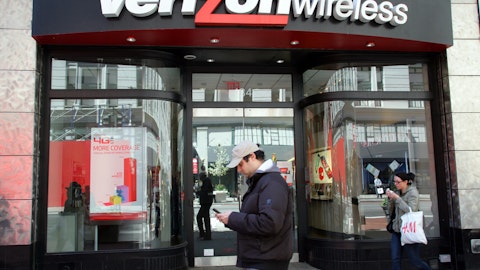Steven Chubak: Thanks. Good morning, David. Good morning, Denis. So I wanted to ask a couple of questions about comp leverage and operating margins. And maybe just to start off, Denis, you noted the adjusted efficiency ratio set at 65% versus the reported figure in the mid-70s. When we try to adjust for various items, at least in the public disclosure, it looks like the core adjusted efficiency somewhere in the upper 60s. And I was hoping you can maybe just help us reconcile some of the different items to get down to that 65% figure and whether that’s the appropriate jumping off point that we should be thinking about as we look ahead to ’24?
Denis Coleman: So, Steven, I’d say, I think the 65% is a good jumping off point for 2024. And as the business evolves from there, as I indicated on a prior question, we have to ultimately be mindful of the mix of the business that comes into the firm. Certain of our activities attract different degrees of transaction-based and other expenses as we prosecute those activities. And so we’ll have to be mindful of what the ultimate business mix looks like. We’ll have to be mindful, obviously, what the ultimate scale and magnitude of the activities is as we roll forward in 2024. I think on the compensation side of the equation, you noticed our disclosure, that was roughly flat on a year-over-year basis. Our revenues net of PCL in the year were up 1%, and our compensation roughly flat.
We observed that we thought that the performance of our core businesses was solid and that we had a year of significant execution activity, and we want to make sure that we’re in a position that we have the talent in place to deliver for clients as we look forward into ’24 with a bit more optimism for what types of activity we could see. In terms of trying to get a handle on the selected items and the degree of repeat potential, most of those are pretty discrete items associated with the exit of activities and the one-off FDIC special assessment. The one area we’ll continue to manage carefully is on CIEs as we continue to manage down the balance sheet as we’ve discussed.
Steven Chubak: That’s great. And just for a follow-up relating to the comments you just made, Denis, on comp leverage, specifically. It looks like the expectation is for revenues to grow about $4 billion this year for The Street. The comp dollars are expected to increase only about $600 million. You do have a good track record of delivering incremental operating leverage or strong marginal margins. But I just wanted to get a sense, given you were alluding to the fact that you’re going to pay for talent and you’re going to compensate people appropriately that execute well on the platform, how we should be thinking about incremental comp leverage, is an 85% comp margin a realistic expectation given where the revenue growth is ultimately going to come from?
Denis Coleman: Steven, I’ll make a comment. David wants to make another one as well. We’re very focused on driving operating leverage across the platform. We’re also focused on driving scale across the platform. And meanwhile, we’re staying true to our mantra of pay-per-performance. It’s what our people expect, and it’s one of the things that enables us to attract such exceptional talent and deliver excellence for our clients. The ultimate compensation payout relative to the results in 2024 really are going to come down to what the ultimate mix of those activities are and what we feel is the appropriate amount of compensation to reflect the performance of the team being mindful of talent retention, service of clients as well as driving operating leverage and delivering results for shareholders.
Steven Chubak: Great. That’s it for me. Thanks for taking my questions.
Denis Coleman: Thank you.
Operator: Thank you. We’ll go next to Mike Mayo with Wells Fargo Securities.
Mike Mayo: Hi. I was just wondering what you’re going to do about the Lead Independent Director, who I guess is no longer on your Board, Bayo, I guess, his firm got purchased and now you need to get a new lead director. Is that someone from the Board currently, someone from outside Goldman Sachs, what type of person is the Board looking for?
David Solomon: So I appreciate the question, Mike. As you highlight, at the end of last week, Bayo sold his business to BlackRock. Bayo still is the Lead Director. That deal won’t close until sometime in the third or fourth quarter. Bayo is the Lead Director. We have a governance process in place. Our Board has met and at the appropriate time, we’ll make announcement as to the transition. But at this point, other than the fact that because of the sale, it will create a transition. I have nothing more to say other than Bayo is still the Lead Director, and we’ll manage the transition in an orderly process and no surprises.
Mike Mayo: Okay. So what? You would consider people outside of Goldman Sachs currently for that or?
David Solomon: Well, we’re always adding people to our Board, Mike. But I’m not going to make comments. I’m not going to make forward comments about our governance process and our Board looks at this at the time that the Board takes action. We announced a clear transition. I’ll be happy to answer questions and talk about it.
Mike Mayo: All right. Thank you.
Operator: At this time, there are no additional questions in queue. Ladies and gentlemen, this concludes The Goldman Sachs Fourth Quarter 2023 Earnings Conference Call. Thank you for your participation. You may now disconnect.
Follow Goldman Sachs Group Inc (NYSE:GS)
Follow Goldman Sachs Group Inc (NYSE:GS)
Receive real-time insider trading and news alerts





